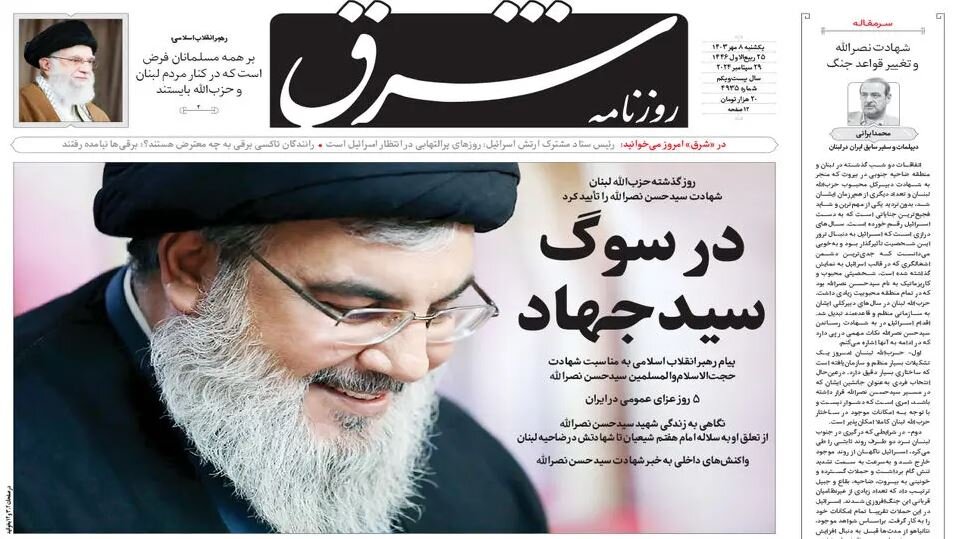Hassan Nasrallah was martyred with US greenlight

TEHRAN - Shargh devoted its editorial to the assassination of Seyyed Hassan Nasrallah by Israel and the crimes committed by this regime.
The paper said: The events of the last few days in Lebanon and the southern suburbs of Beirut, which led to the martyrdom of the beloved Secretary General of Hezbollah and a number of his comrades, undoubtedly is one of the most important and perhaps the most heinous crimes committed by Israel. Israel's recent actions and the escalation of conflicts in the region have not only been done with the green light of America, but in these actions, all the military, security, intelligence, cyber, and technological facilities were at the service of Israel. As we witnessed in the terror operation against senior Hamas officials, including Ismail Haniyeh, and during Iran's missile attacks on Israel called "Operation True Promise", the United States was completely on Israel's side and helped it. An important point that should not be overlooked is that the Resistance movement in Lebanon, Palestine, and the whole region will suffer a sudden shock for a short time over the loss of great commanders, including martyr Seyyed Hassan Nasrallah, but Resistance will continue its path.
Jam-e-Jam: Steps necessary to counter cultural invasion
In a note, Jam-e-Jam addressed the cultural onslaught and Western lifestyle in Iran and said: One of the important aspects of the enemy's cultural influence and lifestyle is to devalue Iran's achievements. America sees itself in conflict with Islamic principles and cannot tolerate an independent system based on Islamic values. But the pro-Western intellectuals, by turning the facts upside down, consider Iran's desire for independence to be the cause of the tension and not the arrogance of the United States. In this context, by abusing the atmosphere of consensus created in the country some domestic media are pushing for consular communication between Iran and the United States. The enemies of Iran, who are afraid of a direct military confrontation with Iran, have infiltrated the cultural sphere to change the people’s lifestyles and mindset to gradually expand their dominion. Therefore, the media and the education system have a serious duty to prevent cultural invasion by enemies.
Donya-e-Eqtesad: Priorities of the Axis of Resistance
In an analysis, Donya-e-Eqtesad discussed the need to restore the Lebanese Hezbollah’s deterrence power in particular and the Axis of Resistance in general. It said: The first step is to quickly revitalize the deterrence power of Hezbollah and the Axis of Resistance, reconstruct the command staff, choose a successor, and appoint new commanders. Assessing the situation and the domain of the response is the second and more important step for which not only Hezbollah but all members of the Axis of Resistance, including the Islamic Republic of Iran, will fully study. The response must create such a deterrence that would stop Israel from considering a ground attack and force it to observe red lines. All assessments indicate that Israel is looking for a regional war with Iran to actively involve the U.S. in the Middle East and provide a situation for Netanyahu to influence Israel's domestic environment and the election atmosphere in the United States in a way that Trump can return to the troubled scene of the Middle East by winning the November 4 elections to continue (normalizing relations between Arab countries and Israel based on) the Abraham Accords.
Iran: The strategist of the Axis of Resistance
In a commentary, the Iran newspaper dealt with the martyrdom of Seyyed Hassan Nasrallah. It quoted Abed Akbari, an expert on international issues, as saying: Martyr Hassan Nasrallah, as a clever strategist, turned Hezbollah into Israel's main enemy that at the same time considered a role model among the Palestinian resistance groups. He also had a great emotional relationship with Iranians and always praised the spirit of resistance among the Iranian people. He believed that the countries that normalize relations with Israel should feel ashamed and not the resistance groups for their relations with the Islamic Republic. During the past four decades, he sympathized with the Iranians when natural disasters such as floods and earthquakes happened and stood on the side of the Iranians at hard times. We faced great challenges and lost leaders in these events, but threats turned into opportunities, and this caused new movements and life.
